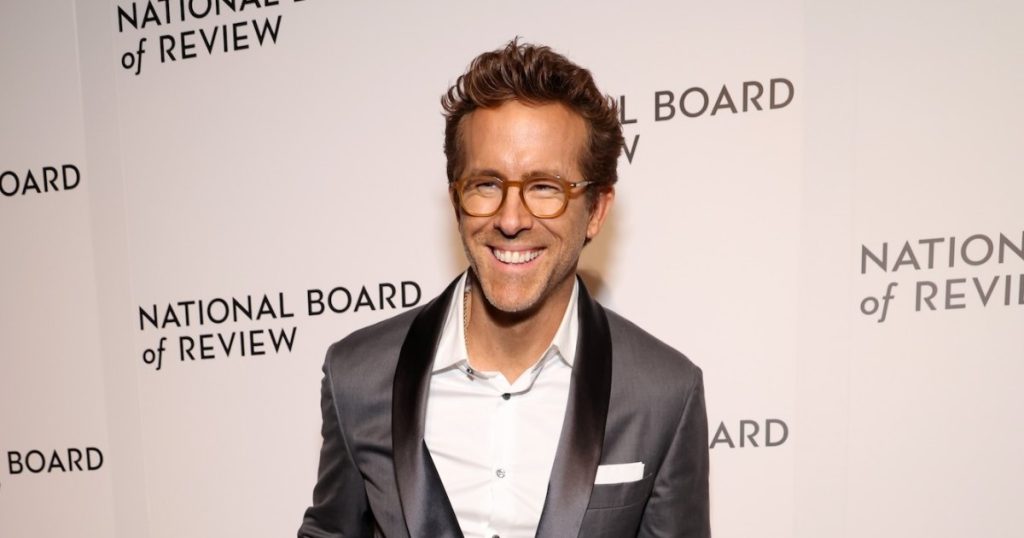Ryan Reynolds, the renowned actor known for his roles in Deadpool and Wolverine, recently made a public appearance at the National Board of Review Annual Awards in New York City. Looking dapper in a gray suit accented with black satin lapels and sporting a pair of reading glasses, Reynolds presented the Best Film award to the cast of the musical “Wicked,” including stars Ariana Grande, Cynthia Erivo, and Ethan Slater. The event marked Reynolds’ first red carpet appearance since legal disputes arose between his wife, actress Blake Lively, and actor/director Justin Baldoni, her co-star in the film adaptation of Colleen Hoover’s novel “It Ends With Us.” Despite the ongoing legal battles, Reynolds appeared unfazed and in good spirits, focusing on the celebratory nature of the awards ceremony.
The timing of Reynolds’ appearance followed his and fellow actor Hugh Jackman’s absence from the Golden Globe Awards held a few days prior. Sources confirmed that their decision not to attend the Golden Globes had been made well in advance and was unrelated to Lively’s legal issues with Baldoni. This clarification sought to dispel speculation that the actors were avoiding the spotlight due to the ongoing controversy. The absence, therefore, appeared to be a matter of prior scheduling rather than a reaction to the legal proceedings involving Lively and Baldoni.
The core of the legal conflict stems from a lawsuit filed by Lively against Baldoni on December 31, 2024. Lively’s suit accuses Baldoni of sexual harassment and creating a hostile work environment during the filming of “It Ends With Us.” Simultaneously, Baldoni filed a separate lawsuit against The New York Times, alleging libel and false light invasion of privacy related to their coverage of Lively’s initial complaint filed with the California Civil Rights Department. The legal crossfire between the two actors has quickly escalated, drawing public attention and generating significant media coverage.
Adding further complexity to the situation, Baldoni’s lawyer, Bryan Freedman, announced the intention to file a separate lawsuit against Lively. Freedman emphasized a desire for transparency, stating their plan to release text messages exchanged between Lively and Baldoni, allowing the public to form their own conclusions based on the evidence. This declaration signals a potentially protracted and contentious legal battle, with each side seemingly prepared to present their version of events through documented communication.
The legal entanglement has also drawn Reynolds into the fray, albeit indirectly. Baldoni’s lawsuit against The New York Times alleges that Reynolds and Lively subjected him to an “inappropriate and humiliating berating” at their New York City apartment prior to filming “It Ends With Us,” accusing them of chastising him for “fat-shaming” Lively in front of other celebrity guests. Furthermore, Baldoni claims that Reynolds exerted pressure on his agent to drop him as a client at the New York City premiere of “Deadpool & Wolverine,” attributing this alleged action to Reynolds’ intent to sabotage his career and personal life. These accusations further complicate the already tangled web of legal disputes, positioning Reynolds as a peripheral figure in the central conflict between Lively and Baldoni.
However, representatives for WME, Baldoni’s former agency, have refuted the claims regarding Reynolds’ alleged pressure at the “Deadpool & Wolverine” premiere. They clarified that Baldoni’s former agent wasn’t present at the premiere and that neither Reynolds nor Lively had exerted pressure to drop Baldoni as a client. This denial directly contradicts Baldoni’s assertion, creating a conflicting narrative about the events surrounding his departure from WME. The contrasting accounts add another layer of complexity to the ongoing legal disputes, leaving the public to discern the truth amidst conflicting claims and accusations.

